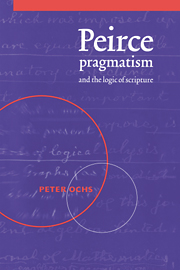Book contents
- Frontmatter
- Contents
- List of abbreviations
- PART I Peirce's pragmatic writing
- 1 Introduction: reading Peirce's pragmatism
- 2 Pragmatic methods of reading and interpretation
- 3 Problems in Peirce's early critique of Cartesianism
- 4 Problems in Peirce's early theory of pragmatism
- 5 Problems in Peirce's normative theory of pragmatism, 1878–1903
- 6 A pragmatic reading of Peirce's lectures on pragmatism
- PART II Peirce's pragmaticist writing
- Notes
- Index
3 - Problems in Peirce's early critique of Cartesianism
Published online by Cambridge University Press: 22 October 2009
- Frontmatter
- Contents
- List of abbreviations
- PART I Peirce's pragmatic writing
- 1 Introduction: reading Peirce's pragmatism
- 2 Pragmatic methods of reading and interpretation
- 3 Problems in Peirce's early critique of Cartesianism
- 4 Problems in Peirce's early theory of pragmatism
- 5 Problems in Peirce's normative theory of pragmatism, 1878–1903
- 6 A pragmatic reading of Peirce's lectures on pragmatism
- PART II Peirce's pragmaticist writing
- Notes
- Index
Summary
Charles Peirce's public career as an epistemologist begins in the mid-1860s with a critique of Descartes' intuitionism. This is a fitting beginning. For Peirce, “Descartes is the father of modern philosophy.” Through his critique of the father, Peirce hopes to launch his reform of all the children: an attempt to restructure the entire project of modern philosophy by referring it back to its errant origins and then forward again, to its proper mission. Most Peirce scholars believe Peirce fails in this attempt, because he fails to fulfill his own goal of formulating this mission a priori. I hope to show, instead, that Peirce sets himself this goal errantly and that he comes much closer to fulfilling his own proper mission: to place the modern project of philosophy back in the pre-modern tradition of practice from which it has sought to divorce itself. No single thinker wrote the bill of divorce per se, but Descartes offers a prototypical transcription.
Through three essays published in 1868–9, Peirce holds the Cartesian prototype up for inspection. He identifies Descartes' fundamental error. He does not yet succeed, however, in repairing it. In this chapter, I put the Pragmatic Method of Reading to use. First, I review Peirce's explicit texts on Descartes, showing both how Peirce hoped to subject Descartes' texts to a comparable reading and how he failed to complete the reading successfully. Peirce's texts display contradictions not unlike those he identifies in Descartes' argumentation.
Information
- Type
- Chapter
- Information
- Peirce, Pragmatism, and the Logic of Scripture , pp. 51 - 73Publisher: Cambridge University PressPrint publication year: 1998
